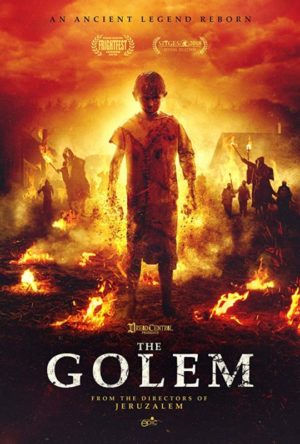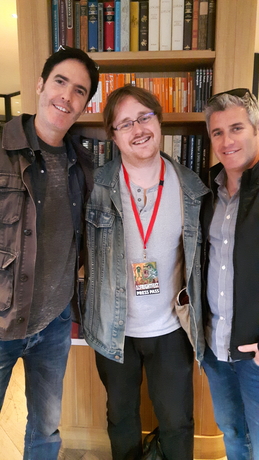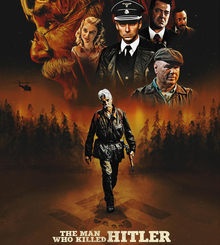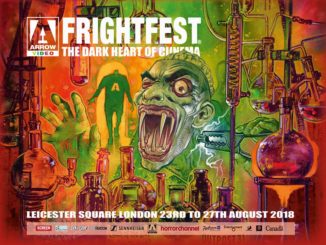
Fright Fest isn’t just a great place to see the latest films – it’s also an opportunity to meet their makers. Among the directors attending Fright Fest this year were The Paz brothers, Doran and Yoav. They previously won us over with their monster hit Jeruzalem: a movie we liked so much our review is on the DVD cover. This time they’re visiting old Blighty for the world premiere of their latest horror: The Golem. A religious tale of hubris, playing God and loss, it further marks them out as a dark force to be reckoned with. Note that this interview took place before the premier of The Golem, when the only information on it was a brief press release and teaser trailer, so the questions asked are very general.
HCF: So what have you guys been up to since we last spoke?
Doran: Sitting at home, playing soccer (laughs)
Yoav: For the last two years we were working on The Golem, and other projects too during the process of The Golem. We just finished it three or four weeks ago, and now it’s out tomorrow
Doran: It’s the first time it’s screening to a real audience
HCF: So we’ll be the first people in the world to see it
Yoav: Except for our family and friends, who of course loved the film, but obviously with an audience its different.
Doran: Yeah.
HCF: So previously you’d done a film in Israel, and now you’re going further into Jewish mythology. What was the draw for this sort of subject matter?
Yoav: So after Jereuzalem was so successful, we thought there’s an appetite for more, so we said we’re Jews in Israel with so much culture and so much mythology around us. Nobody had handled it yet, so we thought this is the path we should go by. So we started digging, and digging, for what should be our next feature film, thinking about things like Jewish exorcisms. Then we thought why not deal with the Golem? Because it’s a Jewish Frankenstein, from years before Frankenstein, written centuries ago, and the last time someone dealt with it in cinema was 100 years ago. There’s one feature film – a silent German movie – and since then nobody tried to make a Golem film. So we decided to make one.
HCF: The subject matter has shown up occasionally, but only in modern day adaptations
Doran: Exactly, but not as a whole film
HCF: It looks like you’re bringing it a lot of religious staples, though was there anything you were conscious of avoiding?
Doran: We’re not religious – we’re Jews, we practice the basics, but not the details. But we had a great combination with our screenwriter, Ariel Cohen, who comes from this world, and our producer is Shalom Eisenbach who used to be a hard-core orthodox. So they brought the details and we brought the storytelling. And for us it’s more like a cinematic story about creating life: what’s it like, what’s the cost of playing God, what can the effect be. That’s what fascinated us. We see it much less as a creature feature and more a dark drama about a woman starting to play God.
HCF: And for researching the period, are either of you big history buffs?
Doran: I like history very much, but we see it more about mythology than that.
Yoav: There’s a famous story about the Golem from Prague, but there’s a lot of other Golem stories that have come up over the years. Every decade there’s a new story about a different Rabbi the Golem. It’s always the same kind of story: you have the Jews being persecuted or slaughtered, and then the Rabbi decides to make a creature out of mud and writes the exact name of God – the 72 letters – and puts it in The Golem’s mouth. Then the Golem saved the community, and this is a story that’s gone on and on in Jewish history for years. So we decided to make this again, of course periodic – not as a historic document, but because it’s a legend. And it’s much easier to tell a legend that takes place without with smartphones, there’s much more mystery. The period setting is perfect for the horror genre.
HCF: Setting it in the 1600s, what did you want from your score?
Yoav: When you’re editing the film you need reference music, which was difficult as this kind of music, a dark twist on traditional Jewish music, was not made. We wanted Jewish motifs and Jewish instruments
Doran: The most significant instrument in Jewish music is the violin – played in such a way like Fiddler on the Roof. Our composer, Tal Yardeni, did an amazing job. It’s like The Witch soundtrack, which was very powerful, but dark and Jewish.
Yoav: It’s a unique sound.

HCF: Do you see a through line between traditional monsters and more modern ones?
Doran: I think at the core of it yes, because we see monsters as the technical stuff. Ok, so he has a knife or an axe, or three eyes or whatever it is – but that’s the easiest part. The more complex part is how this reflects on your protagonist. It’s yin and yang – every protagonist is an antagonist and that’s what challenges them and us as screenwriters to deal with the darker stuff.
Yoav: It’s never about the creature, it’s about the characters around them. It’s why they get sequels all the time – there’s always new victims and new stories around this icon. Most of the time the creature themselves aren’t interesting, but in the end it’s a mirror to the characters.
HCF: How was your working relationship on this one? This is the second you’ve done together
Doran: Actually it’s the third. The first was a Hebrew speaking one, not completely genre, so it didn’t get a big audience. So a few years ago we decided to make an English speaking one for a bigger audience, which we did, and now we want to do it again. We used Israeli actors, but English speaking and shot it in Ukraine, because they had some excellent scenery plus an ancient village. We’ve worked together for three films now, and a lot of TV shows, and it’s working well. We do argue a lot, I’ve got to say.
HCF: Do you have to bring a third party in when you do?
Doran: A lot of times it helps, so we need a strong editor. Some of the most important decisions in filmmaking are in the edit – the process is so important. So we see it as a good thing for the process.
Yoav: Yeah, because when you argue there’s a dialogue so it’s better than being a lonely filmmaker. You need someone to negotiate with and good things come out of that.
HCF: Do both of you bring different things to the table?
Doran: In a way yes – we laugh about it, because Yoav went to film school and I didn’t. So he’s the educated one and I’m streetwise. (Laughs) But the lucky thing is we grew up on the same movies, and we’re only two years apart from each other. There wasn’t any Netflix when we were kids, just five movies on VHS that we saw a hundred times, so our references and interests are much the same. Obviously we’re two human beings with different opinions though.
HCF: Have you got the next few collaborations lined up?
Yoav: We’ve got a couple of them, both genre films. Where we’re from, everyone is drama oriented, with small stories. This is what they teach you in film school: find stories from your own life, keep it real, keep it small. And then most of the films made are small dramas or small comedies, with Hebrew speaking – we’re trying to do it differently. If we can, we’re making films that are English speaking, so they can reach a larger audience, and working within genre with a unique angle. We were very successful with Jeruzalem, reaching millions. And now with a bigger budget we’re hoping to do it again.
You can see a review of The Golem here.




Be the first to comment